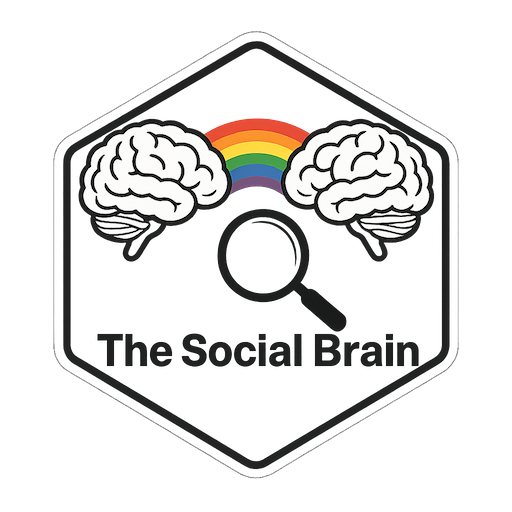Syllabus
Course Details
Code: 376-1309-00
Title: The Social Brain: Critical Perspectives on Science, Society and Neurodiversity
Instructor: Rich Ramsey, PhD.
Contact: See me in class.
Website: www.rich-ramsey.com
Course Description
Meaningful social interactions form the foundation of cohesive societies, with implications extending far beyond psychology and neuroscience into education, technology, policy, and healthcare. Although the scientific study of social behavior has only recently emerged as a distinct research discipline, its applications are already widespread, raising critical questions about the relationship between knowledge creation and societal applications. Simultaneously, multiple scientific disciplines are confronting a “replication crisis,” revealing challenges in reproducing findings and highlighting questionable research practices that demand critical reflection on how scientific knowledge is produced and communicated. This seminar examines the historical, moral, epistemological, and societal contexts of social neuroscience research, encouraging students to question established frameworks and consider a variety of new perspectives. We begin by exploring how a widespread replication crisis has emerged in science and what it means for both research practices and public science literacy. The seminar then applies this critical lens to social neuroscience, examining how reconceptualizing cognitive variation as a natural continuum rather than through deficit models can transform scientific understanding and promote more inclusive societal perspectives that value the rich diversity of human experience and capability.
Learning Outcomes
- To examine critically how neuroscientific concepts, theories, and findings relate to broader historical, moral, and social contexts, enhancing reflective competencies.
- To question the production and validation of scientific evidence within the context of the replication crisis, enabling students to evaluate how knowledge is created, validated, and communicated.
- To understand how conceptualising cognitive variation as a natural continuum challenges deficit-focused models, promoting more inclusive frameworks for society.
- To develop effective communication skills for translating complex scientific concepts to diverse audiences, fostering public understanding of science.
Format
Lectures will be split into two sections with a short break in the middle. I will present material in the first half. In the second half, students will break into small groups and have time to read and discuss relevant papers from that week’s material.
Structure
Introduction
In week 1’s lecture, I will outline the structure of the course, introduce the topics to be covered and give details on the assessment.
Crisis and Reform
In weeks 2 to 5, I will outline critical perspectives associated with the reproducibility crisis in psychology and outline some of the proposed solutions. You will also consider the extent to which the reproducibility crisis extends into other domains of science.
Neurodiversity
In weeks 9 – 13, we will cover a range of topics associated with neurodiversity.
Essay writing Q&A
In week 14, we will discuss features of well-written essays, students can ask questions regarding their chosen topics as well as spend time planning their assignments.
Schedule
Semester: Autumn
When: Tuesdays 10:15am to 12noon
Location: LFW B2
| Week | Date | Lecture | Description |
|---|---|---|---|
| 1 | Sep 16 | Intro | Introduction to the course |
| 2 | Sep 23 | Crisis Part 1 | Is psychological science in a crisis? |
| 3 | Sep 30 | Crisis Part 2 | The reform movement in psychological science |
| 4 | Oct 7 | Crisis Part 3 (Recorded lecture) | A problem in theory? |
| 5 | Oct 14 | Crisis Part 4 (No lecture - reflective writing) | Does the crisis extend beyond psychology? |
| 6 | Oct 21 | Social Neuroscience Part 1 | An introduction to social neuroscience |
| 7 | Oct 28 | Social Neuroscience Part 2 | Reading faces and bodies |
| 8 | Nov 4 | Social Neuroscience Part 3 | Understanding others |
| 9 | Nov 11 | Neurodiversity Part 1 | Re-thinking neurodiversity |
| 10 | Nov 18 | Neurodiversity Part 2 | Guest lecture: A view from the clinic |
| 11 | Nov 25 | Neurodiversity Part 3 | Loneliness |
| 12 | Dec 2 | Neurodiversity Part 4 | Autism |
| 13 | Dec 9 | Neurodiversity Part 5 | Attention and impulsivity |
| 14 | Dec 16 | Essay Writing | Essay writing |
Assessment
The assessment is based on each student writing an essay. In week 1, comprehensive assessment details will be provided. Please note: there is no exam.
Submission date: Monday January 5th 2026.
Assessment criteria:
Threshold
Adequate understanding of the material is demonstrated, which is largely based on information provided within lectures.
Good
Generally accurate coverage of relevant material, which shows evidence of independent thought that extends lecture materials. Well organised and structured.
Excellent
Consistently accurate coverage of relevant material, which shows a depth of independent thought that comprehensively extends lecture materials. Well organised and structured with a clear and efficient writing style.
Reflective writing
In week 5, there will be no lecture. Instead, you are required to write 500-750 words on on the extent extent to which the reproducibility crisis extends beyond psychology and human neuroscience. This written reflection is NOT MARKED. For more details, see here.
Feedback
Feedback is provided in the following ways:
- Lecture discussion throughout the semester.
- Written feedback on each student’s assignment.
Supporting Materials
Lectures
Lecture slides will be posted before each lecture.
Texts, journal articles and books
The course will feature select material from books and journal articles. This material will be available on this website or via ETHZ’s library holdings and subscriptions.

Social Neuroscience
In weeks 6 – 8, we will cover foundational aspects of social neuroscience.